工程硕士研究生英语教学课件UNIT5
- 格式:pdf
- 大小:2.91 MB
- 文档页数:8

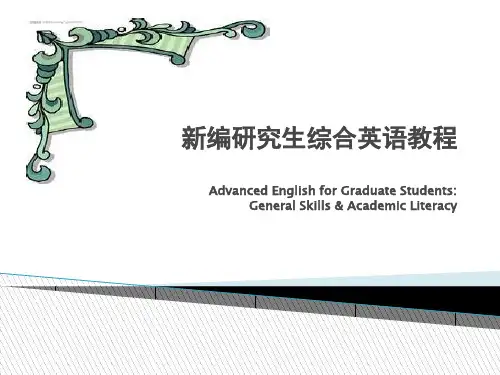
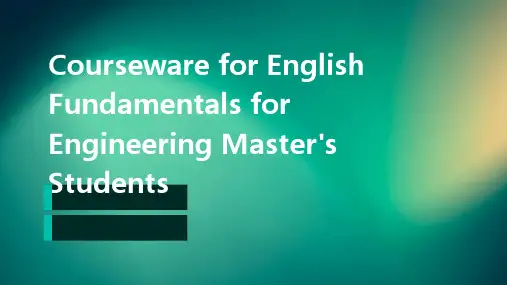

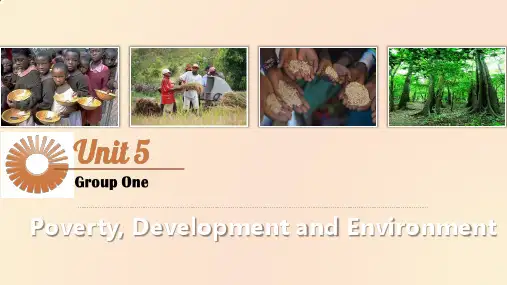
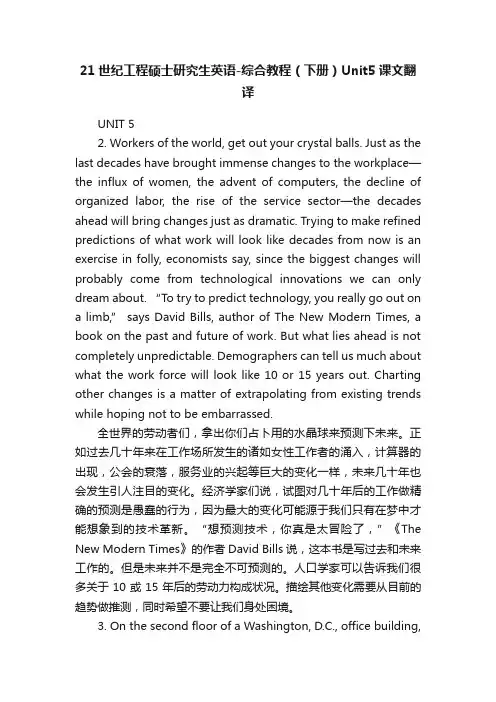
21世纪工程硕士研究生英语-综合教程(下册)Unit5课文翻译UNIT 52. Workers of the world, get out your crystal balls. Just as the last decades have brought immense changes to the workplace—the influx of women, the advent of computers, the decline of organized labor, the rise of the service sector—the decades ahead will bring changes just as dramatic. Trying to make refined predictions of what work will look like decades from now is an exercise in folly, economists say, since the biggest changes will probably come from technological innovations we can only dream about. “T o try to predict technology, you really go out on a limb,” says David Bills, author of The New Modern Times, a book on the past and future of work. But what lies ahead is not completely unpredictable. Demographers can tell us much about what the work force will look like 10 or 15 years out. Charting other changes is a matter of extrapolating from existing trends while hoping not to be embarrassed.全世界的劳动者们,拿出你们占卜用的水晶球来预测下未来。
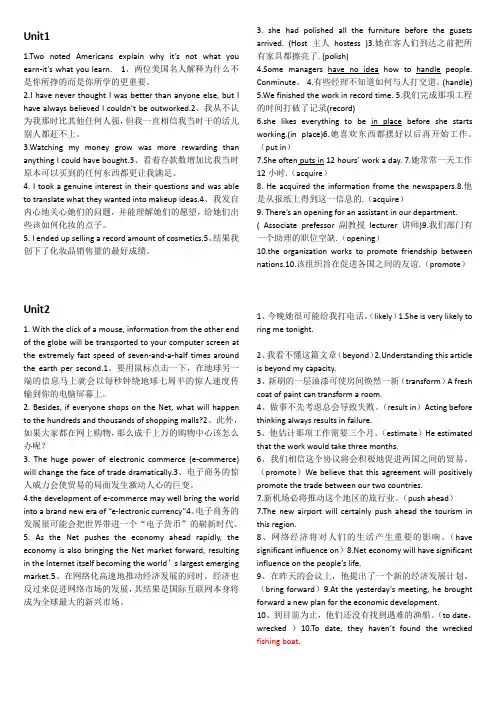
Unit11.Two noted Americans explain why it’s not what you earn‐it’s what you learn. 1、两位美国名人解释为什么不是你所挣的而是你所学的更重要。
2.I have never thought I was better than anyone else, but I have always believed I couldn’t be outworked.2、我从不认为我那时比其他任何人强,但我一直相信我当时干的活儿别人都赶不上。
3.Watching my money grow was more rewarding than anything I could have bought.3、看着存款数增加比我当时原本可以买到的任何东西都更让我满足。
4. I took a genuine interest in their questions and was able to translate what they wanted into makeup ideas.4、我发自内心地关心她们的问题,并能理解她们的愿望,给她们出些该如何化妆的点子。
5. I ended up selling a record amount of cosmetics.5、结果我创下了化妆品销售量的最好成绩。
3. she had polished all the furniture before the gusets arrived. (Host 主人 hostess )3.她在客人们到达之前把所有家具都擦亮了. (polish)4.Some managers have no idea how to handle people. Conminute。
4.有些经理不知道如何与人打交道。
(handle)5.We finished the work in record time. 5.我们完成那项工程的时间打破了记录(record)6.she likes everything to be in place before she starts working.(in place)6.她喜欢东西都摆好以后再开始工作。
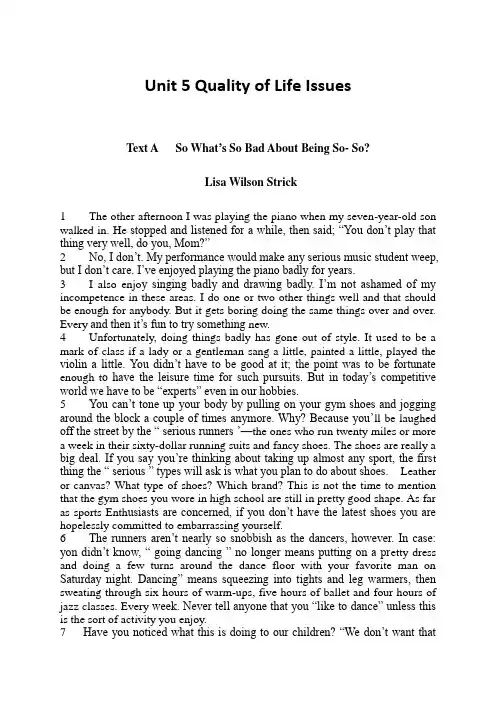
Unit 5 Quality of Life IssuesText A So What’s So Bad About Being So- So?Lisa Wilson Strick1 The other afternoon I was playing the piano when my seven-year-old son walked in. He stopped and listened for a while, then said; “You don’t play that thing very well, do you, Mom?”2 No, I don’t. My performance would make any serious music student weep, but I don’t care. I’ve enjoyed playing the piano badly for years.3 I also enjoy singing badly and drawing badly. I’m not ashamed of my incompetence in these areas. I do one or two other things well and that should be enough for anybody. But it gets boring doing the same things over and over. Every and then it’s fun to try something new.4 Unfortunately, doing things badly has gone out of style. It used to be a mark of class if a lady or a gentleman sang a little, painted a little, played the violin a little. You didn’t have to be good at it; the point was to be fortunate enough to have the leisure time for such pursuits. But in today’s competitive world we have to be “experts” even in our hobbies.5 You can’t tone up your body by pulling on your gym shoes and jogging around the block a couple of times anymore. Why? Because you’l l be laughed off the street by the “ serious runners ’—the ones who run twenty miles or more a week in their sixty-dollar running suits and fancy shoes. The shoes are really a big deal. If you say you’re thinking about taking up almost any sport, the first thing the “ serious ” types will ask is what you plan to do about shoes. Leather or canvas? What type of shoes? Which brand? This is not the time to mention that the gym shoes you wore in high school are still in pretty good shape. As far as sports Enthu siasts are concerned, if you don’t have the latest shoes you are hopelessly committed to embarrassing yourself.6 The runners aren’t nearly so snobbish as the dancers, however. In case: yon didn’t know, “ going dancing ” no longer means putting on a pre tty dress and doing a few turns around the dance floor with your favorite man on Saturday night. Dancing” means squeezing into tights and leg warmers, then sweating through six hours of warm-ups, five hours of ballet and four hours of jazz classes. Every w eek. Never tell anyone that you “like to dance” unless this is the sort of activity you enjoy.7 Have you noticed what this is doing to our children? “We don’t want thatnerd on our soccer team,” I overheard a ten-year-old complain the other day. “He doesn’t know a goal kick from a head shot. ” As it happens, the “nerd” that the boy was talking about was my son, who did not-—-like some of his friends—start , soccer instruction at age three. I’m sorry, Son, I guess I blew it. In my day, when we played baseball, we expected to give a little instruction to the younger kids who didn’t know how to play. It didn’t matter if they were terrible; we weren’t out to slaughter the other team. Sometimes we didn’t even keep score. To us, sports were just a way of having a good time.8 I don’t think kids have as much fun as they used to. Competition keeps getting in the way. The daughter of a neighbor is a nervous wreck worrying about getting into the best tennis school. “ I was a late starter, ” she told me, “ and I on ly get to practice five or six hours a week, so my technique may not be up to their standards. ” The child is nine. She doesn’t want to be a tennis player when she grows up; she wants to be a nurse. I asked what she likes to do for fun in her free time. Sh e seemed to think it was an odd question. “ Well, I don’t actually have a lot of free time,” she said. “Homework and tennis and piano lessons kind of eat it all up. I have piano lessons three times a week now, so I have a good shot at getting into the all-state orchestra . ”9 Ambition, drive and the desire to excel are all great within limits, but I don’t know where the limits are anymore. I know a woman who’s been complaining for years that she hasn’t got the time to study a foreign language. I’ve point ed out that an evening course in French or Italian would take only a couple of hours a week, but she keeps putting it off. I suspect that what she hasn’t got the tim e for is to become completely fluent within one year and that any lower level of accomplishment would embarrass her. Instead she spends her evenings watching TV and tidying up her closets—occupations at which no particular expertise is expected.10 I know lots of other people, too, who avoid activities they might enjoy because they lack the time or the energy to tackle them seriously. It strikes me as so silly. We are talking about recreation. I have nothing against self-improve-ment. But when I hear a teenager muttering “practice makes perfect” as he grimly makes his four-hundred-and-twenty-seventh try at hooking the basket-ball into the net left-handed, I wonder if some of us aren’t improving ourselves right into the insane asylum.11 I think it’s time we put a stop to all this. For sanity’s sake,each of us should vow to take up something new this week—and to make sure we never master it completely. Sing along with grand opera. Make peculiar-looking objects out of clay. I can tell you from experience that a homemade cake still tastes pretty good even if it doesn’t look perfect. The point is to enjoy being a beginner again; to rediscover the joy of creative fooling around. If you find it difficult ask any two-year-old to teach you. Two-year-olds have a gift for tackling & impossible with enthusiasm; repeated failure hardly discourages them at all.12 As for me, I’m getting a little out of sha pe, so I’m looking into golf. A lot people I know enjoy it, and it doesn’t look too hard. Given a couple of lesson, I should be stumbling gracelessly around the golf course and playing badly no time at all.(1045words)。

UNIT 5 MAKING A GOOD PRESENTATION◆Warming-upA. Key: 1-e 2-j 3-b 4-f 5-c 6-a 7-g 8-i 9-d 10-hB. Key: audience, facilities, time, style… (Students can use any words in A to fill in the blanks here.)C. Teaching Tips:The beginning part of a presentation is the most difficult section of a speech. Students usually don’t know how to do it effectively. Generally speaking, the following items are the key points a presenter should mention at the very beginning:1) a greeting2) your name and position3) the title and subject4) the objective of the presentation5) the main parts of your talk6) a mention of the visual aids that you will use7) the time you will take8) when you would like questions9) a reference to the audience10) a link to the first section of your presentationReference Key:1. B2. D3. C4. three5. First…Then…Finally6. 13 minutes7. 30 minutes8. A9. B10. DScript:Good morning everyone. Thanks for coming. For those of you who don’t know me, my name is Jacky Chen, and I’m the Marketing Manager for Welsh Limited. I’m here today to present our new marketing plan, which is designed to introduce our products to the Chinese market. My presentation is composed of three parts. First, I’ll introduce our analysis of th e current opportunities that exist in the Chinese market. Then, I’ll go over the cases that have been successful for similar products in China in the past. Finally, I’ll finish by explaining how we will go into the Chinese market, based on conclusions from our research. I estimate my preparedremarks will cover about 13 minutes, and the next 30 minutes will be dedicated to answering your questions. Hopefully, you’ve all received the handout material I sent. Now, let’s start…D. Teachers can show the script of Part C to students to let them follow the example and compose their own work.◆Fast ReadingTeaching Tips: The following questions can be asked before checking students answers.1. What does each paragraph mainly talk about?2. What key points does the speaker focus on in his presentation?3. What do you know about Henry’s Car Company?4. What is the difference between Honda CRV and Audi A8L?Reference key:1. F2. T3. F4. T5. T6. F7. T8. F9. F 10. F◆Intensive ReadingEffective presentation skills are critical for success in business today. Whether in meetings or formal presentations, business professionals are required to speak with confidence and credibility. However, many have not had any education or instruction in how to deliver effective presentations. Many professionals feel fear and anxiety about the process and in fact, they may try to avoid giving presentations because of the stress that the assignment causes.“Ten Simple Rules” presents what the author thinks to make a good oral presentation. They can be applied broadly across different disciplines. If one puts these rules into practice, there will be greater chances for him / her to succeed, because good presentations encourage broader dissemination of one’s work and highlight work that may not receive attention in written form.Paragraph 11. In today's workplace, good presentation skills are essential. Even those workers who aren't required to make presentations regularly as part of their job may be expected to present information occasionally at meetings.Vocabularyessential: a. necessary; indispensable; most important必不可少的e.g. Is money essential to happiness?金钱对于幸福是必不可少的吗?occasionally: adv. now and then; at times偶尔地e.g. He visits me occasionally.他偶尔来看我。

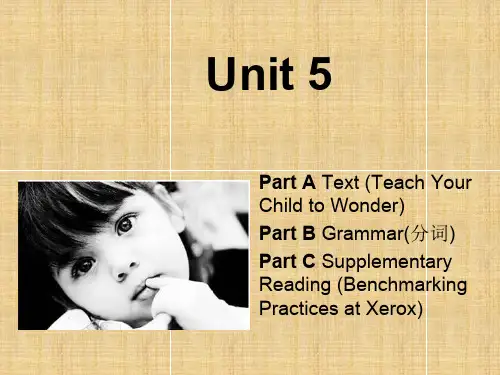
新编研究生英语系列教材Unit Five Success and HappinessLesson A Listening and SpeakingObjectives:This part aims to train students' ability to get some idea about how to get the main idea and identify the supporting examplesProcedure:Activities will mostly focus on scripts listening and exercises will be provided as practice for the skill required.Step 1 Listening practiceStep 2 ExerciseStep 3 Speaking skills: Public Speech SkillsThe structure of a written script1) The Beginning2) The Body3) The ClosingStep 4 Speaking Practice:Make a prepared speech on the topic of My Understanding of SuccessLesson B Reading and WritingObjectives:To improving students' general comprehension and some specific skills in reading a text or passageTo be able to understand the text structure of the passageTo enable the student to make correct/idiomatic use of certain vocabularyTo familiarize with students with certain writing skills and formats with different styles.To provide the students with relevant exercises to strengthen their language skillsText A Aristotle Got It RightDavid Cameron General Understanding of the PassageMain Idea:Text Structure AnalysisLanguage Points1. Wellbeing n. a contented state of being happy and healthy and prosperousThe conclusions come in a study of how people perceive their wellbeing.结论来自于一份研究人们如何理解幸福的报告。